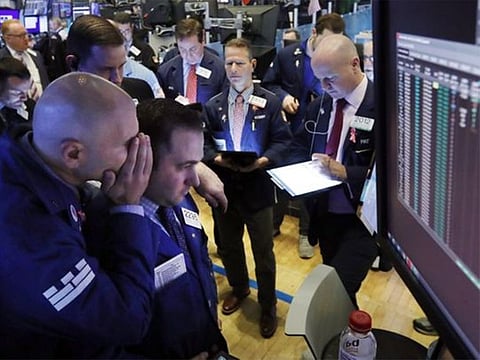Market optimism hurt by inflation concerns, weaker econ data
Analysts debate whether investor sentiment will stay subdued on hints of economic decline

Dubai: Earnings from global retailers will steal the limelight this week, in stock markets witnessed significant declines amid concerns of inflation in the world’s largest economy, the US, and its potential ripple effects in other parts of the world.
Last week, the US stock market suffered one of its biggest pullbacks in months, with investors looking for clues on the pace of inflation and consumer spending and whether companies can sustain their strong earnings momentum. This subdued sentiment was seen in markets elsewhere as well.
The S&P 500 fell 4 per cent from Monday through Wednesday, the biggest three-day drop for the benchmark index since late October, after several months of largely steady increases to record highs, although it partially rebounded at the end of the week.
Inflationary concerns
Investors are currently perturbed by inflationary concerns as the potential spark for greater turbulence after data showed consumer prices rose in April by the most in about 12 years.
After a surprisingly weak jobs report, results from retail giants such as Walmart, Target, Home Depot, Ralph Lauren and L Brands will offer the latest insight on how the top economy is faring as businesses rebound from the coronavirus pandemic.
Stocks rebounded somewhat on Thursday and Friday, putting the S&P 500’s gain for the year at more than 10 per cent. The level of market uncertainty may have reduced slightly but more-or-less still remains.
Rising volatility
The CBOE Volatility Index - known as Wall Street’s fear gauge - moved lower but was still above most of the past month’s levels. The market’s volatility last week was exacerbated by sparked fears that the Federal Reserve could be forced to tighten its accommodative monetary policy.
Data showed US retail sales unexpectedly stalled in April, shifting the focus to companies for their views on the state of consumer spending. Inflation concerns will be at the forefront. Higher inflation could crimp consumer demand and profit margins or force the US central bank to tighten monetary policy.
Elsewhere, alongside other global markets, European shares had continued a sharp rebound on Friday, following a sell-off in stocks at the start of trading week.
Stocks rebounding?
The pan-European STOXX 600 closed higher by 1.2 per cent, with automotive sector adding 1.9 per cent to lead gains while basic resources was the only sector in the red, shedding 1 per cent.
Markets in Europe received a strong handover from Asia-Pacific, where Japan’s Nikkei 225 led gains across the region. On Wall Street, US stocks jumped on Friday but the major averages were still on track for modest losses for the week as inflation fears hit sentiment.
UK Prime Minister Boris Johnson has said his government is concerned about the increased transmissibility of the new COVID-19 variant first detected in India, and indicated that nothing can be ruled out in potential efforts to curtail it.
Signs of quick rebound
However, analysts are also of the opinion that investors should be able set aside inflation worries and buy shares hammered by the week’s volatility, with the shift back into riskier assets dragging on the US dollar.
On Friday, the US Dow Jones Industrial Average had climbed 1 per cent, while the S&P 500 jumped 1.5 per cent, the most on any day since March 26, and the Nasdaq Composite leaped 2.3 per cent, its biggest one-day rise in about two months.
The MSCI World Index, which tracks 50 markets, jumped 1.5 per cent on recovering sentiment. Some investors also warn that investors may be too complacent if they ignore the dangers of accelerating price pressures.








